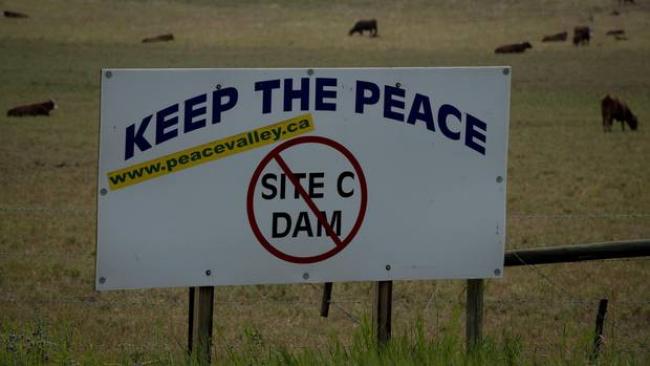Articles Menu

The federal government has rejected a call from the Royal Society of Canada and some 250 scientists and academics to put a halt to British Columbia’s Site C hydroelectric project despite concerns that the federal-provincial approval in 2014 ignored serious environmental impacts and trampled on First Nations’ rights.
In a letter to Prime Minister Justin Trudeau, Royal Society of Canada president Maryse Lassonde noted that the Site C project is proceeding despite a large number of adverse environmental impacts, and despite ongoing opposition from First Nations whose traditional territory will be affected.
“Past projects often neglected or ignored aboriginal peoples and their concerns – with adverse and lingering consequences,” Ms. Lassonde wrote. “Those days are supposed to be over.”
At a news conference in Ottawa Tuesday, two University of British Columbia professors urged Ottawa to revisit the cabinet order approving the Site C project and explain why a project that would have an “unprecedented” number of significant environmental impacts is necessary when other, cheaper and less damaging alternatives are available.
Karen Bakker holds a Canada research chair in water governance at UBC, while Gordon Christie is a professor of indigenous legal studies at the university’s law school. With the backing of some 250 scientists and other scholars, they said they hoped to meet with federal ministers to press their case to halt the project until further reviews could be held. The Royal Society of Canada is an association of top scholars; its “committee on intervention in the public interest” took up the Site C case and endorsed the B.C. group’s findings.
However, a spokeswoman for Environment Minister Catherine McKenna signalled that the government has no intention to revisit the Site C environmental assessment.
The project was approved by the former Conservative government – as well as British Columbia – in late 2014 and permits were issued last October, noted Ms. McKenna’s press secretary, Caitlin Workman. In January, Ms. McKenna released a set of “transition” principles that would apply until the new government can rework the much-criticized environmental assessment process.
“As outlined in the principles, project reviews will continue within the current legislative framework and in accordance with treaty provisions,” Ms. Workman said. “This includes not revisiting projects that have been reviewed and approved.”
B.C. Energy Minister Bill Bennett said the critics are wrong to suggest the review was less than robust, noting that the joint review panel considered 29,000 pages of evidence. “I don’t agree that there was anything defective about the Site C joint panel process,” he said.
The hydroelectric project will deliver the lowest-cost, cleanest power available, the minister said, although he conceded it would have adverse environmental impacts downstream.
Some Treaty 8 First Nations – which are based in Alberta – have filed lawsuits to block the Site C project, and unsuccessfully sought an injunction to prevent construction from commencing until the legal action had been heard. The aboriginal communities argue that the dams on the upper Peace River have already severely altered the hydrology of the river and threaten wildlife, especially in the Peace-Athabasca Delta, which is the world’s largest boreal delta and a UNESCO world heritage site.
Prof. Bakker said the scope of environmental effects from Site C are “unprecedented in the history of environmental assessment in Canada.”
Prof. Christie said the Liberal actions on the Site C project will be a test of the Liberals’ approach to First Nations. “Clearly this project should be put on hold until these [disputed] matters are resolved,” he said. “And it’s a test of this particular government whether they are going to take seriously treaty rights and work towards reconciliation.”
[Top photo: A sign protesting the Site C proposal is pictured near Hudson's Hope, B.C., on July, 17, 2014.
(JONATHAN HAYWARD/THE CANADIAN PRESS)]